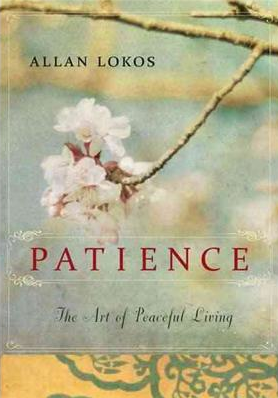
Note: The winners for this giveaway have already been chosen. Subscribe to Tiny Buddha for free daily or weekly emails and to learn about future giveaways!
The Winners:
Patience is one of those qualities we aspire to possess, but sometimes struggle to embody. We associate patience with goodness—and for good reason, since patience enables us to be loving and supportive to others.
But patience is also a fundamental building block of happiness. It just plain hurts to feel harried, stressed, rushed, and eager to get there—whether it’s a physical space or a state of being.
This is something I know all too well, as I’ve often felt pushed by this subconscious internal need to do things quickly and perfectly, which just exacerbates my anxiety, since this translates into a lack of patience with myself.
It’s something I work at, which is why I was excited to read Patience: The Art of Peaceful Living, by Allan Lokos.
The founder and guiding teacher of The Community Meditation Center in New York City, Allan Lokos has studied and practiced meditation for nearly two decades. In his insightful book, Lokos provides gentle encouragement and practical tools to step back, slow down, and foster a sense of equanimity.
I highly recommend Patience to anyone who feels easily annoyed, angered, and stressed, and to those who want to deepen their existing mindfulness practice.
The Giveaway
To enter to win 1 of 2 free copies of Patience: The Art of Peaceful Living:
- Leave a comment below
- Tweet: RT @tinybuddha Book GIVEAWAY & Interview: Patience by Allan Lokos http://bit.ly/KVyQ85
If you don’t have a Twitter account, you can still enter by completing the first step. You can enter until midnight PST on Friday, July 6th.
The Interview
1. In the beginning of Patience, you wrote about what inspired you to write this book. Can you tell us about that?
Like so many others, I’ve experienced the suffering caused by moments of impatience and outbursts of anger, both my own and that of others. I also have a deep appreciation of the ancient wisdom teachings on patience; it is one of the paramis, or “perfection” practices taught by the Buddha. But there seemed to be little offered in contemporary literature.
The actual moment of inspiration came when a friend said, “Just about every mistake I have ever made and every unkind word I have ever spoken might have been avoided if I had been more patient.” I thought it was an extraordinary statement and I knew it was true for me as well.
2. As someone who has been working on my patience a great deal, I highlighted numerous sections in your book! One such section reads, “Anger, annoyance, and impatience deplete energy. Patient effort strengthens our resources.” Can you expand on that?
I think that the depletion of energy that goes with impatience, anger, and annoyance is familiar to most of us. There is usually a great deal of frustration that accompanies situations in which things are not going the way we would like.
That frustration and unhappiness are debilitating. Therefore, developing a depth of patience is an obvious antidote to that depletion of energy. Note, however, that there is a significant difference between skills that help us deal with impatience once it has arisen, and developing patience so that impatience has much less chance to arise.
That level of patience takes effort and determination to develop. The good news is that it doesn’t require a great deal of time each day but it does take motivation, courage, and honesty.
3. Early on, you explained that using techniques to get through a challenging situation without completely losing it is not true patience. I found this fascinating, as I’ve often found myself counting in my head or taking deep breaths to get through difficult times. How would you define true patience?
It not so much a matter of definition as it is concept.
Once you are counting to ten or reminding yourself to take a few deep breaths you are already experiencing impatience. Skills such as deep breathing and counting are invaluable and can help prevent a disaster.
True patience, as a practice, is the ability to sense the arising of impatience or anger at its very inception and to be mindful of the fact that these are feelings. There is no need to act on every feeling that arises. In fact it would be unwise and exhausting.
This kind of skill takes wisdom, awareness, and practice because our usual response is to try to change the external circumstances that we feel are the causes of our annoyance or impatience.
Perhaps, in some instances, it would be wise and compassionate to make changes in external conditions, but the place to look first is within one’s self. Then we are much more likely to act wisely, patiently, and compassionately.
4. You also wrote, “…impatience with self can easily become a type of self-hatred.” What’s a simple practice we can adopt to become more patient with ourselves?
Again, the place to look is within. Those of us who meditate regularly can see how we speak to ourselves. Are we kind and loving or are we harsh and critical?
No one is more deserving of your love and tenderness than you are yourself. That may be difficult for some to accept in our society, but I strongly recommend considering this truth.
5. In the section on relationships, you explored some of the inevitable challenges we face when become emotionally intimate with someone else. What would you say is the biggest obstacle to patience in relationships, and how can start to overcome it?
I’m hesitant to try to single out one biggest obstacle but I think that working on one’s self goes a long way toward developing meaningful relationships. Working on skillful speech and deep listening will go a long way in making you a magnificent partner.
6. You explained that society views kindness as a secondary quality, below aggression, ambition, and toughness—and that some members of your family have expressed that they’d rather be feared than liked. Why do you think many people feel this way?
There can certainly be a time and place for ambition and other aggressive qualities. I think hard work, vision, and creativity are admirable traits. We just want to be aware of the suffering caused by grasping and clinging.
I wonder if we are somewhat afraid to be seen as kind because we might be viewed as weak and spineless. To be kind and compassionate is not to be a doormat. Qualities such as compassion, patience, and equanimity are the ground of wisdom because it is these qualities that help see things as they really are.
7. You shared quite a few “profiles in patience” in your book. Was there one story that resonated with you most strongly, and why?
I quickly came to love the people profiled in the book but I was probably moved mostly by Michael Naranjo. Michael was blinded and lost the use of most of his right hand in the Vietnam war, yet he went on to become a world renowned sculptor.
He has become a treasured friend whom I enjoy being with because of his good cheer, intelligence, honesty, and courage. He is always experiencing physical pain and never complains. He is also an extraordinary artist.
8. In the section titled, “At the Water Cooler,” you referenced research that reveals many people are not happy in their work situations. What advice would you offer someone who is trying to improve their professional situation, but feels impatient with that process—and carries that with them every day?
The reality of the current global economic condition is that many people who, in a different time might have been able to find a more satisfying work situation, simply cannot right now and perhaps not for some time. Therefore, the only meaningful change that can be made may be in one’s perspective.
I know this is easy to say and not necessarily easy to do, but it may be the best option. Look deeply to see if there is another way to view your circumstance. There usually is. Let your heart open and allow yourself to experience beginner’s mind.
9. In your research, what have you found are the situations in which people most frequently lose their cool—and how can we avoid that?
The most frequently reported cause of impatience was when people felt they were not being heard. Next was when they were tired or hungry. Fatigue and hunger are pretty easy to address: get more rest and eat properly. The sense of not being heard (or seen) is more challenging.
I would start by looking within to see if something is being touched that I can examine within myself. Next consider the possibility that you are being heard but the other person simply disagrees. Finally, you might address the situation at the right time and place by saying “I feel as if I’m not being heard. I’d like to go over that point again.”
10. At the end of your book, you wrote a brief section titled “Patience as a Way of Life.” Can you briefly summarize what that would look like?
Patience as a way of life has a feeling of equanimity that is vibrant and alive. We are not thrown by the constant ups and downs of life. Joy is easy to come by and decisions are made with wisdom and compassion. There is much more, but that would be a darn good start.
Learn more about Patience: The Art of Peaceful Living on Amazon.
FTC Disclosure: I receive complimentary books for reviews and interviews on tinybuddha.com, but I am not compensated for writing or obligated to write anything specific. I am an Amazon affiliate, meaning I earn a percentage of all books purchased through the links I provide on this site.
About Lori Deschene
Lori Deschene is the founder of Tiny Buddha. She started the site after struggling with depression, bulimia, c-PTSD, and toxic shame so she could recycle her former pain into something useful and inspire others to do the same. You can find her books, including Tiny Buddha’s Gratitude Journal and Tiny Buddha’s Worry Journal, here and learn more about her eCourse, Recreate Your Life Story, if you’re ready to transform your life and become the person you want to be.
- Web |
- More Posts













 Though I run this site, it is not mine. It's ours. It's not about me. It's about us. Your stories and your wisdom are just as meaningful as mine.
Though I run this site, it is not mine. It's ours. It's not about me. It's about us. Your stories and your wisdom are just as meaningful as mine. 